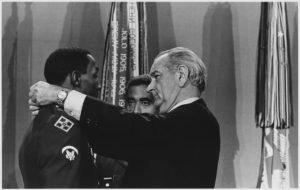
Skip wasn’t the same when he came back from the war. By many accounts, including his own, he was a pretty “good boy” growing up, active in his community, doing well in school. It wasn’t easy growing up in Detroit, he didn’t know his biological father, but he and his younger half-brother were raised well by his mother. When he got back, though, things seemed to change.
Those who knew him before didn’t know about the nightmares. Those who were closest to him were allowed to see the pictures, though, pictures of his time overseas. Some of them were pictures of the enemy dead. He had a hard time getting a job; although he was previously outgoing and friendly, he didn’t have much success in job interviews. He only tried to apply for low-level jobs with minimal qualifications, and still struggled. When asked questions by prospective employers, he would mumble, and wouldn’t get the job.
After a while, though, he did land a good job. He got it based on his veteran status, because of what happened while he deployed. Things really seemed like they were turning around. He got married, and he and his new wife moved into a house in a better part of Detroit. He couldn’t quite afford it on what he was being paid, but he thought it was something that they should have. His good humor started to come back, he and his wife had a son, and he started to become more active in his community again.
Slowly, though, things started to unravel. The bills were starting to pile up. Skip bounced a check at the grocery store, but he was still picking up the tab wherever he went, running up the family’s credit card. He didn’t talk about his time during the war; one of the few who knew some of what happened was his wife, and she only knew because she slept in the same bed. She found out fairly quickly that she should wake him up from the other side of the room, because he could be dangerous when she woke him up abruptly.
He started missing important meetings at work. The police were called one night, because he threatened to shoot his neighbors because of their barking dog. He started experiencing stomach pains and was diagnosed with ulcers…and finally referred to mental health. When he finally did start to talk to someone about the stuff that happened while he was deployed, it didn’t go well; he was in and out of inpatient facilities over a period of eighteen months. There were times that he would engage with his treatment providers, talking about what happened, the vivid memories that had haunted him for over two years, and then there were times that he would take off.
He finally left treatment for good. His car was repossessed, so he used some back pay and bought another one. He took out a loan that he wouldn’t be able to repay, and stayed at home and slept or watched TV. He had not paid his mortgage in nine months, his wife was in the hospital for a surgical procedure that he couldn’t afford, and the house was about to be foreclosed.
One night, Skip called a friend and asked them to give him a ride to see someone who would help him out with some money. After catching a ride from his friend, Skip went to a bar, had a couple of drinks, and then walked across the street to a convenience store.
Skip walked up to the register to buy a pack of cigarettes; when the cashier opened the register, Skip pulled out a .22 caliber pistol and demanded the cash. There was a struggle for Skip’s gun, and he pulled the trigger, twice, wounding the cashier…then the cashier, the owner of the convenience store, reached down for his own gun and opened fire on Skip. The owner warned Skip, even after shooting him twice, that he was going to kill him, but Skip didn’t move, and didn’t stop pointing his gun…so the owner continued to fire.
Skip was taken to the hospital and pronounced dead. His funeral was held with full military honors at Arlington National Cemetary, and he currently rests in Lot 471, Section 31.
Sound familiar? It might, but not for the reasons you might think. Dwight “Skip” Johnson was a veteran of the Vietnam War, and was awarded the Congressional Medal of Honor for his actions in a battle near Dak To on January 14, 1968.

This story was deliberately told backwards, and out of sync. There is much more to Dwight’s story than what I wrote here, but the similarities between his experiences and the experiences of veterans today are striking. Even the circumstances the firefight that resulted in his Medal of Honor are familiar to many veterans today: after spending a year as a member of a tank crew that he grew to love as a family, he was inexplicably switched to another tank crew the day before the battle at Dak To. His old tank took a direct hit in the opening moments of the battle, and Dwight…Skip…became overwhelmed with rage and grief. This happens so frequently, and tragically, that it’s one of the most common stories with veterans who struggle with unresolved grief. They’re usually the gunner on one truck, and they are pulled to be a driver on another; then their old truck gets hit. One Soldier is kept back off of a mission for some reason, and the one who replaces them is killed.
Dwight’s story played out a full decade before Posttraumatic Stress Disorder was recognized as a psychological condition, and similar stories are playing out today, three decades after PTSD became a thing. There has been progress, and relief is possible, even though PTSD does not fully explain all of Dwight’s challenges.
I first read about Specialist Johnson’s life and tragic death in the book, Medal of Honor: Profiles of America’s Military Heroes From the Civil War to the Present by Allen Mikaelian. A significant portion of this article was based on his profile from this book, and his story certainly warrants a deeper read. If you are a veteran, are the family member of a veteran, or work with veterans in any way, this book is an excellent resource for a look at what veterans experience.
One of the most poignant statements made about Skip’s life came from his mother, which was chosen to end an article that was written about him in 1971, and chosen to end his profile in the Medal of Honor book: “Sometimes I wonder if Skip tired of this life and needed someone else to pull the trigger.”
Sound familiar? Hopefully not. But it probably does. If you’re a veteran, reach out for help. If you’re a family member and you see something familiar here, reach out for help as well. One tragic ending like Dwight Johnson is enough for this world.




3 Comments
Sharon Gaul · February 3, 2017 at 12:19 pm
Need to remember that our Vietnam veterans and younger veterans have same issues. Too many fell between the cracks then as they are today. Sad story, probably too often repeated.
Vic · February 4, 2017 at 11:56 pm
Pretty sad and tragic. I know someone someone, wife, possibly friends, coworkers, doctors, or neighbors had to see or know of the changes. So as the article suggests, please ask or even just engage them in conversation, if you have any concerns that aren’t aren’t answered seek help with /for the veteran, please you may just save their lives.
Duane France · February 7, 2017 at 10:16 am
Vic, your words are ones that veterans should hear. Unfortunately, they don’t always reach out until it is too late, or nearly too late. Thanks for taking the time to comment!
Comments are closed.